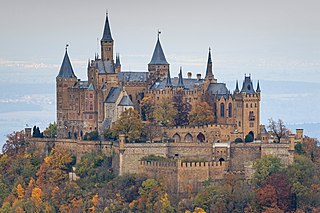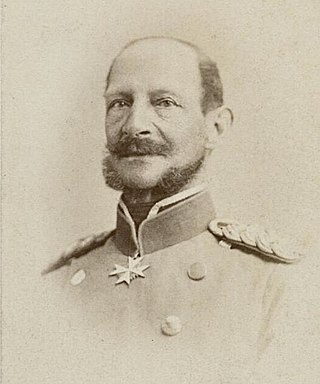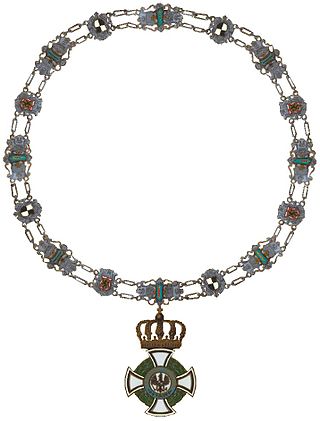
The House of Hohenzollern is a formerly royal German dynasty whose members were variously princes, electors, kings and emperors of Hohenzollern, Brandenburg, Prussia, the German Empire, and Romania. The family came from the area around the town of Hechingen in Swabia during the late 11th century and took their name from Hohenzollern Castle. The first ancestors of the Hohenzollerns were mentioned in 1061.

Frederick William II was king of Prussia from 1786 until his death in 1797. He was in personal union with the prince-elector of Brandenburg and sovereign prince of the Canton of Neuchâtel. As a defensive reaction to the French Revolution, Frederick William II ended the German Dualism between Prussia and Austria. Domestically, he turned away from the enlightened style of government of his predecessor and introduced a tightened system of censorship and religious control. The king was an important patron of the arts especially in the field of music. As a skilled cellist he enjoyed the dedication of various cello-centric compositions by composers Mozart, Haydn, Boccherini, and Beethoven. He was also responsible for some of the most notable architecture in Prussia, including the Brandenburg Gate in Berlin, the Marble Palace, and Orangery in the New Garden, Potsdam.

Wilhelm, German Crown Prince, Crown Prince of Prussia was the eldest child of the last Kaiser, Wilhelm II, German Emperor, and his consort Augusta Victoria of Schleswig-Holstein, and thus a great-grandson of Queen Victoria, and distant cousin to many British royals, such as Queen Elizabeth II and King Charles III. As Emperor Wilhelm's heir, he was the last Crown Prince of the German Empire and the Kingdom of Prussia, until the abolition of the monarchy.

Louis Ferdinand, Prince of Prussia was a member of the princely House of Hohenzollern, which occupied the Prussian and German thrones until the abolition of those monarchies in 1918. He was also noteworthy as a businessman and patron of the arts.

The Order of the Black Eagle was the highest order of chivalry in the Kingdom of Prussia. The order was founded on 17 January 1701 by Elector Friedrich III of Brandenburg. In his Dutch exile after World War I, deposed Emperor Wilhelm II continued to award the order to his family. He made his second wife, Princess Hermine Reuss of Greiz, a Lady in the Order of the Black Eagle.

Prince Oskar Karl Gustav Adolf of Prussia was the fifth son of German Emperor Wilhelm II and Augusta Victoria of Schleswig-Holstein-Sonderburg-Augustenburg.

Prince Wilhelm Eitel Friedrich Christian Karl of Prussia was the second son of Emperor Wilhelm II of Germany by his first wife, Princess Augusta Viktoria of Schleswig-Holstein-Sonderburg-Augustenburg. He was born and died in Potsdam, Germany.

Hohenzollern Castle is the ancestral seat of the imperial House of Hohenzollern. The third of three hilltop castles built on the site, it is located atop Mount Hohenzollern, above and south of Hechingen, on the edge of the Swabian Jura of central Baden-Württemberg, Germany. The name derives from Söller (terrace) from Latin solarium.

Prince Frederick Henry Albert of Prussia was the fifth son and youngest child of King Frederick William III of Prussia and Louise of Mecklenburg-Strelitz. His parents had fled to East Prussia after the occupation of Berlin by Napoleon, and Albert was born in Königsberg. Two of Albert's elder brothers were Frederick William IV, King of Prussia from 1840 till 1861, and William I, King of Prussia from 1861 to 1888 and German Emperor from 1871 until 1888.

Duchess Cecilie Auguste Marie of Mecklenburg-Schwerin was the last German Crown Princess and Crown Princess of Prussia as the wife of Wilhelm, German Crown Prince, the son of Wilhelm II, German Emperor.

The House Order of Hohenzollern was a dynastic order of knighthood of the House of Hohenzollern awarded to military commissioned officers and civilians of comparable status. Associated with the various versions of the order were crosses and medals which could be awarded to lower-ranking soldiers and civilians.

Prince Wilhelm Friedrich Franz Joseph Christian Olaf of Prussia was the eldest child of Wilhelm, German Crown Prince, and Duchess Cecilie of Mecklenburg-Schwerin. At his birth, he was second in line to the German throne and was expected to succeed to the throne after the deaths of his grandfather, Emperor Wilhelm II, and his father, Crown Prince Wilhelm. Both, however, outlived him.

Prince Johann Georg of Hohenzollern was a German prince, and through his marriage to Princess Birgitta of Sweden, was brother-in-law of King Carl XVI Gustaf of Sweden.

Prince Joachim Viktor Wilhelm Leopold Friedrich Sigismund of Prussia was a German World War I fighter pilot and member of the House of Hohenzollern. He was the son of Prince Friedrich Leopold of Prussia and Princess Louise Sophie of Schleswig-Holstein-Sonderburg-Augustenburg, married in 1916.

Prince Karl Franz Josef Wilhelm Friedrich Eduard Paul of Prussia was the only child of Prince Joachim of Prussia and Princess Marie-Auguste of Anhalt. He was also the grandson of Wilhelm II, German Emperor.

Prince Friedrich Wilhelm of Prussia was a member of the House of Hohenzollern, great-grandson of King Frederick William III of Prussia.

Sophie, Princess of Prussia is married to Georg Friedrich Prinz von Preussen, head of the formerly-ruling House of Hohenzollern.

The Monarchy of Germany was the system of government in which a hereditary monarch was the sovereign of the German Empire from 1871 to 1918.

Wilhelm Heinrich Michael Louis Ferdinand Friedrich Franz Wladimir Prinz von Preussen was a descendant of the Hohenzollern dynasty which ruled Germany until the end of World War I. His great-grandfather Wilhelm II was the German Emperor and King of Prussia until 1918. Although Kaiser Wilhelm died in exile and his family was stripped of much of its wealth and recognition of its rank and titles by the German Republic, Michael spent nearly all of his life in Germany.

Prince Friedrich Heinrich Albrecht, Prince of Prussia was a Prussian officer, member of the house of Hohenzollern, and a great-grandson of Friedrich Wilhelm III of Prussia. He was persecuted for being homosexual.





















